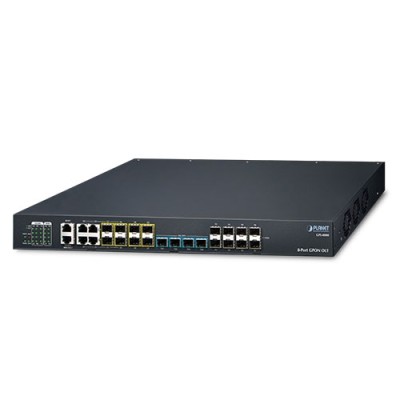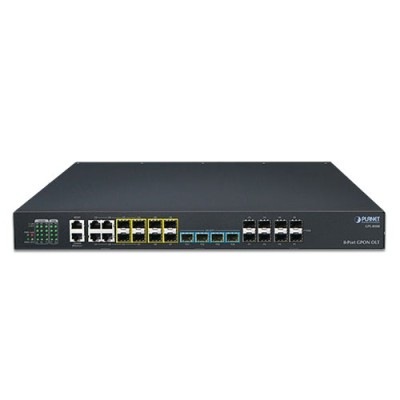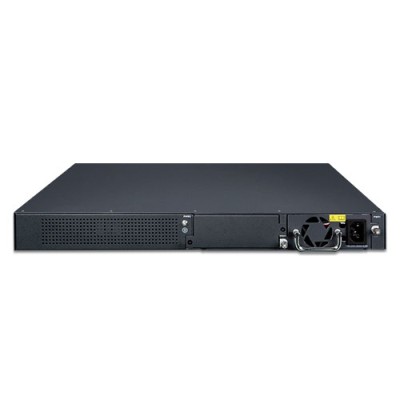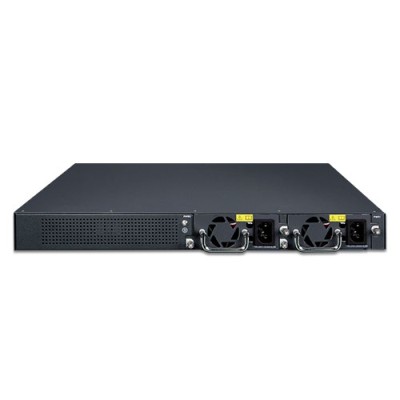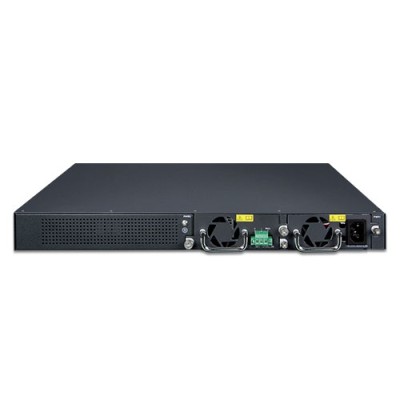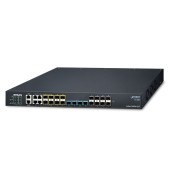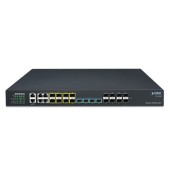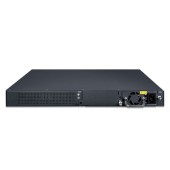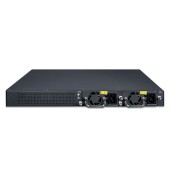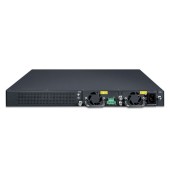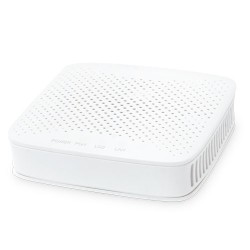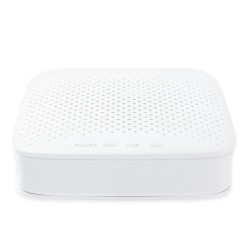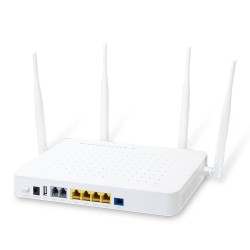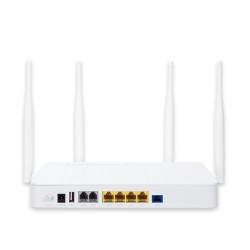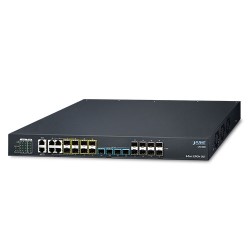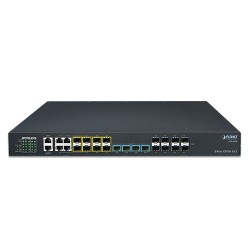- Stock: In Stock
- Brand: PLANET
- Model: GPL-8000
- Weight: 6.86kg
- Dimensions: 30.40cm x 44.00cm x 4.40cm
High-performance GPON for FTTx Applications
PLANET GPL-8000 GPON Optical Line Terminal (OLT) consists of eight GPON ports, four Gigabit TP/SFP combo ports, four Gigabit SFP ports, four 10G SFP+ ports and one management port. It complies with ITU-T G.984/G.988 and meets the requirements about GPON OLT in network access technical requirements.
It is easy to install and maintain a GPON deployment up to 1024 ONU and HGU devices, providing highly-effective GPON solutions and convenient management for fiber optic broadband network.
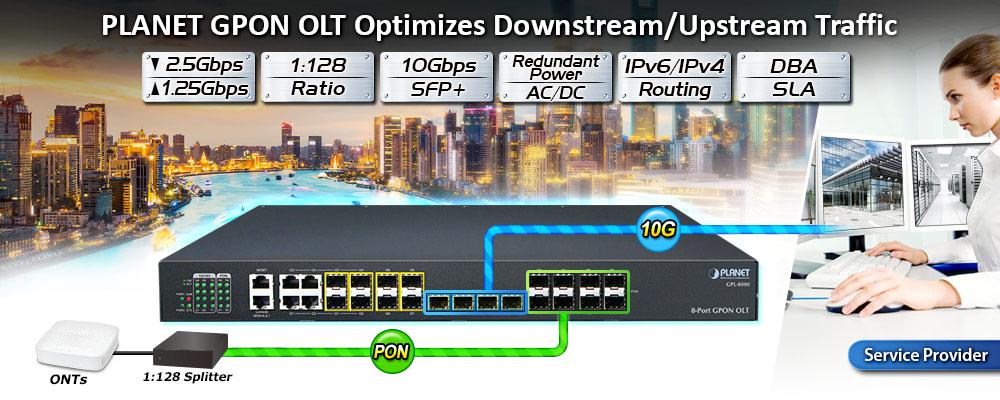
High-speed and Long-distance Coverage for Triple Play Services
The GPL-8000 provides a high bandwidth of up to 2.5Gbps for downstream and 1.25Gbps for upstream, long-distance coverage of up to 20km between equipment nodes, and flexibility for network deployment. It is a cost-effective access technology with reliable and scalable network for triple-play service applications such as HDTV, IPTV, voice-over-IP (VoIP) and multimedia.
High Split Ratio for a Cost-effective Network Solution
The GPL-8000 is an ideal solution for FTTx applications. It helps to minimize the investment cost for carriers by offering a high split ratio of 1:128 per port and supporting the usage of PLANET ONUs. The GPL-8000 provides strong functionalities for Ethernet features such as VLAN, Dynamic Bandwidth Allocation (DBA), Service Level Agreement (SLA) and Access Control List. GPON protocol allows a Gigabit Ethernet communications fiber to be shared by multiple end users using a passive optical splitter.
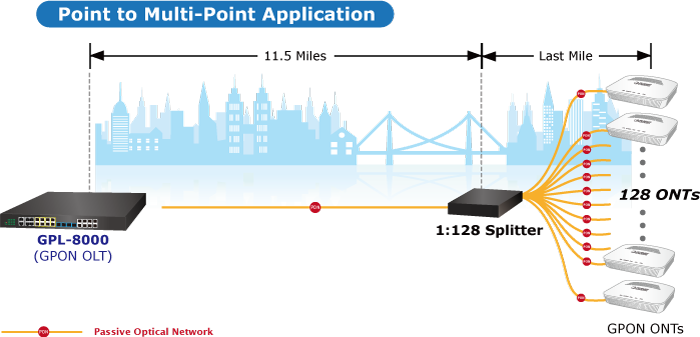
Flexible and Extendable 10Gb Ethernet Solution
The GPL-8000 has four 10G SFP+ uplink ports to deliver ultra-high speed networking over long distances to service providers. Each of the 10G SFP+ slots supports dual speed and 10GBASE-SR/LR or 1000BASE-SX/LX. With its 4 ports, 10G Ethernet link capability and additional 8-port 1G Ethernet link capability, the administrator now can flexibly choose the suitable SFP/SFP+ transceiver according to the transmission distance or the transmission speed required to extend the network efficiently. The GPL-8000 provides broad bandwidth and powerful processing capacity for FTTx applications for distribution data link.
Extractive Power Supply Design to Increase Flexibility
The GPL-8000 is equipped with one extractive 100~240V AC power supply unit, so it is easy to replace the power for users. Besides, the GPL-8000 reserves another backup power slot on the rear panel and users can add the second AC or DC power to the redundant power supply installation. The AC power or DC power is optional. The redundant power system is specifically designed to handle the demands of high-tech facilities requiring the highest power integrity.
Layer 3 Routing Support
The GPL-8000 enables the administrator to conveniently boost network efficiency by configuring Layer 3 static routing manually, the RIP (Routing Information Protocol) or OSPF (Open Shortest Path First) settings automatically.
- The RIP can employ the hop count as a routing metric and prevent routing loops by implementing a limit on the number of hops allowed in a path from the source to a destination.
- The OSPF is an interior dynamic routing protocol for autonomous system based on link-state. The protocol creates a link-state database by exchanging link-states among Layer 3 switches, and then uses the Shortest Path First algorithm to generate a route table based on that database.
Robust Layer 2 Features
The GPL-8000 can be programmed for basic switch management functions such as port speed configuration, port aggregation, VLAN, Spanning Tree Protocol, WRR, bandwidth control and IGMP snooping. It also supports 802.1Q tagged VLAN, Q-in-Q and GVRP Protocol. In addition, the number of VLAN interfaces is 4K. By supporting port aggregation, the GPL-8000 allows the operation of a high-speed trunk combined with multiple ports. It enables up to 32 groups for trunking with a maximum of 8 ports for each group.
Efficient and Secure Management
For efficient management, the GPL-8000 is equipped with console, Web and SNMP management interfaces.
- With the built-in Web-based management interface, the GPL-8000 offers an easy-to-use, platform-independent management and configuration facility.
- For text-based management, it can be accessed via Telnet and the console port.
- For standard-based monitor and management software, it offers SNMPv3 connection which encrypts the packet content at each session for secure remote management.
Moreover, the GPL-8000 offers secure remote management by supporting SSHv2, TLSv1.0 and SSLv3 connection which encrypts the packet content at each session.
Cost-effective, Long-distance and High-bandwidth Triple Play or Surveillance Applications
PLANET GPL-8000 delivers high-speed voice, data and video services to residential and business subscribers. With the PON technology, the GPL-8000 offers competitive advantages including a long-term life expectancy of the fiber infrastructure, lower operating costs from the reduction of “active” components, support of up to 20km distance between equipment nodes, easy Installation and maintenance, and most importantly, offering of much greater bandwidth.
The GPL-8000 is the perfect solution for triple play or surveillance applications by offering benefits of cost-effectiveness, scalability and flexibility to network deployment.
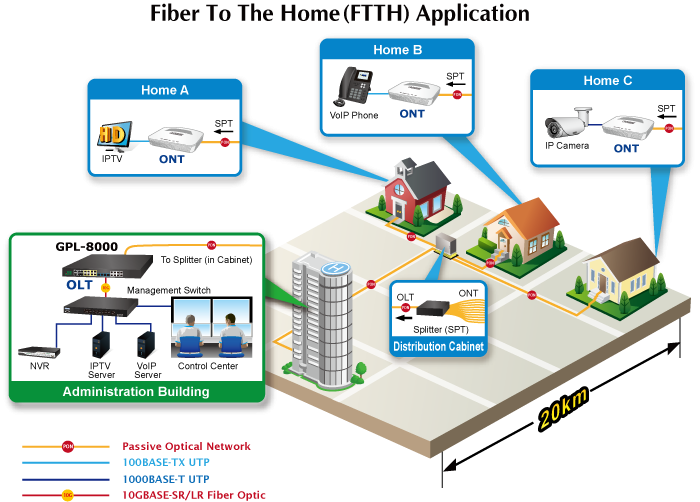
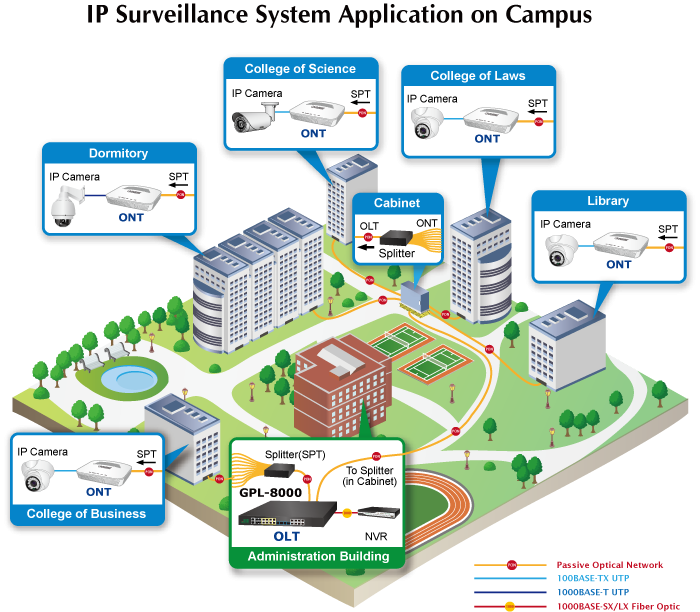
GPON Ports
- 8 GPON OLT SFP slots
- Up to 2.5Gbps downstream and 1.25Gbps upstream
- Maximum transfer distance of up to 20km
- Each PON port supports up to 128 ONT/HGU
- Compliant with G.984/G.988
Physical Ports
- 4 10/100/1000BASE-T RJ45 copper ports
- 8 100/1000BASE-X SFP slots
- 4 10GBASE-SR/LR SFP+ slots
- RJ45 to DB9 console interface for switch basic management and setup
- One 10/100BASE-TX Management port
OLT Management
- User-friendly GUI management
- 2 control interfaces
- Out-of-Band IP – the management RJ45 port
- In-Band IP – the Gigabit TP, SFP and 10G SFP+ uplink ports
- Supports ONT/HGU authentication; averts illegal ONT access to network
ONT/HGU Management
- ONT/HGU port control
- ONT/HGU VLAN mode
IP Routing Features
- Supports dynamic routing protocol: RIP and OSPF
- IPv4 static routing
- Routing interface provides per VLAN routing mode
Layer 2 Features
- Supports VLAN
- IEEE 802.1Q tag-based VLAN
- Provider Bridging (VLAN Q-in-Q, IEEE 802.1ad) supported
- GVRP for dynamic VLAN management
- Supports Link Aggregation
- 802.3ad Link Aggregation Control Protocol (LACP)
- Cisco ether-channel (static trunk)
- Supports Spanning Tree Protocol
- STP, IEEE 802.1D (Classic Spanning Tree Protocol)
- RSTP, IEEE 802.1w (Rapid Spanning Tree Protocol)
- MSTP, IEEE 802.1s (Multiple Spanning Tree Protocol, spanning tree by VLAN)
- Port mirroring to monitor the incoming or outgoing traffic on a particular port (many to 1)
- Supports G.8032 ERPS (Ethernet Ring Protection Switching)
- Loop protection to avoid broadcast loops
- Link Layer Discovery Protocol (LLDP)
Quality of Service
- Ingress shaper and egress rate limit per port bandwidth control
- 8 priority queues on all switch ports
- IEEE 802.1p CoS/DSCP/Precedence
- VLAN ID
- Policy-based ingress and egress QoS
Multicast
- Supports IPv4 IGMP snooping v1, v2 and v3
- Supports IPv6 MLD snooping v1 and v2
- Querier mode support
- MVR (Multicast VLAN Registration)
Security
- Authentication
- IEEE 802.1x port-based network access authentication
- Built-in RADIUS client to cooperate with the RADIUS servers
- RADIUS/TACACS+ users access authentication
- Access Control List
- IP-based Access Control List (ACL)
- MAC-based Access Control List (ACL)
- Time-based ACL
- DHCP Snooping to filter distrusted DHCP messages
- Dynamic ARP Inspection discards ARP packets with invalid MAC address to IP address binding
- IP Source Guard prevents IP spoofing attacks
Management
- IPv4 and IPv6 dual stack management
- Switch Management Interfaces
- Console and Telnet Command Line Interface
- HTTP web switch management
- SNMP v1 and v2c switch management
- SSHv2, SSLv3, TLSv1.0 and SNMP v3 secure access
- SNMP Management
- Four RMON groups (history, statistics, alarms, and events)
- SNMP trap for interface Link Up and Link Down notification
- Built-in Trivial File Transfer Protocol (TFTP) client
- BOOTP and DHCP for IP address assignment
- System Maintenance
- Firmware upload/download via HTTP
- Reset button for system reboot or reset to factory default
- Dual images
- DHCP Functions:
- DHCP Relay
- DHCP Option 82
- DHCP Server
- User Privilege levels control
- Network Time Protocol (NTP) and SNTP
- Network Diagnostic
- SFP-DDM (Digital Diagnostic Monitor)
- ICMP remote IP ping
- Syslog remote alarm
- System Log
| Hardware Specifications | |
|---|---|
| GPON Ports | 8, supporting Class C+, Class C++ and Class B+ |
| 10/100/1000BASE-T RJ45 Ports | 4 TP/SFP combo interfaces, shared with Port-1 to Port-4 |
| 1000BASE-X SFP Slots | 8, supporting 1000BASE-SX/LX/BX SFP transceiver Backward compatible with 100BASE-FX SFP transceiver |
| 10GBASE-X SFP+ Slots | 4, supporting 10GBASE-SR/LR SFP+ transceiver |
| Management Port | One 10/100BASE-TX RJ45 port |
| Console | One RJ45-to-RS232 serial port (9600, 8, N, 1) |
| CPU | 600MHz |
| RAM | 512MB |
| Flash Memory | 32MB |
| Dimensions (W x D x H) | 440 x 304 x 44 mm |
| Weight | 5,500g |
| Power Consumption | 60 watts/204.73BTU |
| Power Requirements - AC | 100~240V AC, 1.5A max. |
| Power Requirements - DC | 36~72V DC, 3A max. |
| Fan | 3 |
| Switching | |
| Switch Architecture | Store-and-forward |
| Switch Fabric | 176Gbps |
| Switch Throughput | Uplink 87Mpps Downlink 102Mpps |
| Address Table | 40K |
| ARP Table | 8K |
| ACL Table | 1K |
| Shared Data Buffer | 2MB |
| Jumbo Frame | 2KB |
| Flow Control | Back pressure for half duplex IEEE 802.3x pause frame for full duplex |
| GPON Specifications | |
| Transmission Speed | Downstream: 2.5Gbps Upstream: 1.25Gbps |
| Optical Split Ratio | Up to 128 |
| Transmission Distance | 20km |
| PON Module Wavelength | TX: 1490nm; RX: 1310nm |
| PON Fiber Type | 9/125um SMF(Single mode fiber optic) |
| Layer 3 Functions | |
| IP Interfaces | Max. 1K VLAN interfaces for IPv4 Max. 256 VLAN interfaces for IPv6 |
| Routing Table | 32K for IPv4 8K for IPv6 |
| Routing Protocols | Static routing RIP OSPF |
| Layer 2 Functions | |
| Port Configuration | Port disable/enable Auto-negotiation 10/100/1000Mbps full and half duplex mode selection Flow control disable/enable Bandwidth control on each port Port loopback detect |
| Port Mirroring | TX/RX/Both Many to 1 |
| VLAN | IEEE 802.1Q tag-based VLAN, up to 4K VLAN groups IEEE 802.1ad Q-in-Q VLAN stacking/tunneling GVRP for VLAN management |
| Spanning Tree Protocol | IEEE 802.1D Spanning Tree Protocol (STP) IEEE 802.1w Rapid Spanning Tree Protocol (RSTP) IEEE 802.1s Multiple Spanning Tree Protocol (MSTP) |
| Multicast | IPv4 IGMP v1/v2/v3 snooping IPv4 Querier mode support IGMP Filtering and IGMP Throttling IGMP Proxy reporting IGMP multicast forwarding IPv6 MLD v1/v2 snooping Multicast VLAN Register (MVR) Up to 2K multicast groups |
| Link Aggregation | IEEE 802.3ad Ling Aggregation Control Protocol (LACP) Static trunk link aggregation Supports 32 groups with 8 ports per trunk group Up to 80Gbps bandwidth (full duplex mode) Load Balance Algorithm: - Source IP/destination IP/Source + destination IP - Source MAC/destination MAC/Source + destination MAC |
| Storm Control | Per 100pps 1-14880 |
| Bandwidth Control | At least 64Kbps stream |
| QoS | PON interfaces: Dynamic Bandwidth Allocation (DBA) Service Level Agreement (SLA) Limiting the upstream/downstream rate based on each ONT/ONU/HGU 8 priority queues on all switch ports Scheduling for priority queues - Weighted Round Robin (WRR) - Strict priority Traffic classification: - IEEE 802.1p CoS/DSCP/Precedence - VLAN ID - Policy-based ingress and egress QoS |
| Ring | IGU-T G.8032 ERPS Ring |
| Security Functions | |
| Access Control List | Supports Standard and Expanded ACL - IP-based ACL - MAC-based ACL - Time-based ACL ACL based on: - MAC Address - IPv4/IPv6 IP Address - Protocol-number - sport/dport - ToS/Precedence Up to 1k entries |
| Security | Transmission data encryption on the PON interface MAC limitation MAC sticky Port isolation DHCP snooping Dynamic ARP inspection IP source guard |
| AAA | TACACS+ and IPv4/IPv6 over RADIUS |
| Network Access Control | IEEE 802.1x port-based network access control |
| Management Functions | |
| System Configuration | Console and Telnet Web browser SNMP v1, v2c |
| Secure Management Interfaces | SSHv2, SSLv3 Maximum 8 sessions for SSH and telnet connection |
| System Management | IPv4 and IPv6 dual stack management SNMP MIB and TRAP SNMP RMON 1, 2, 3, 9 four groups Firmware upgrade by HTTP/TFTP/FTP protocol through Ethernet network Configuration upload/download through HTTP/TFTP/FTP protocol Supports IEEE 802.1ab LLDP protocol NTP and SNTP client RADIUS authentication for IPv4/IPv6 login user name and password |
| Event Management | Remote syslog System log |
| SNMP MIBs | RFC 1213 MIB-II RFC 1215 Internet Engineering Task Force RFC 1271 RMON RFC 1354 IP-Forwarding MIB RFC 1493 Bridge MIB RFC 1643 Ether-like MIB RFC 1907 SNMPv2 RFC 2011 IP/ICMP MIB RFC 2012 TCP MIB RFC 2013 UDP MIB RFC 2096 IP forward MIB RFC 2233 if MIB RFC 2452 TCP6 MIB RFC 2454 UDP6 MIB RFC 2465 IPv6 MIB RFC 2466 ICMP6 MIB RFC 2573 SNMPv3 notification RFC 2574 SNMPv3 VACM RFC 2674 Bridge MIB Extensions |
| Standard Conformance | |
| Regulatory Compliance | CE / FCC / LVD |
| Standards Compliance | IEEE 802.3z Gigabit 1000BASE-SX/LX IEEE 802.3ae 10Gb/s Ethernet IEEE 802.3x flow control and back pressure IEEE 802.3ad port trunk with LACP IEEE 802.1D Spanning Tree Protocol IEEE 802.1w Rapid Spanning Tree Protocol IEEE 802.1s Multiple Spanning Tree Protocol IEEE 802.1p Class of Service IEEE 802.1Q VLAN tagging IEEE 802.1X port authentication network control IEEE 802.1ab LLDP RFC 768 UDP RFC 793 TFTP RFC 791 IP RFC 792 ICMP RFC 2068 HTTP RFC 1112 IGMP v1 RFC 2236 IGMP v2 RFC 3376 IGMP v3 RFC 2710 MLD v1 FRC 3810 MLD v2 |
| Environments | |
| Operating | Temperature: 0 ~ 50 degrees C Relative Humidity: 5 ~ 90% (non-condensing) |
| Storage | Temperature: -10 ~ 70 degrees C Relative Humidity: 5 ~ 90% (non-condensing) |

